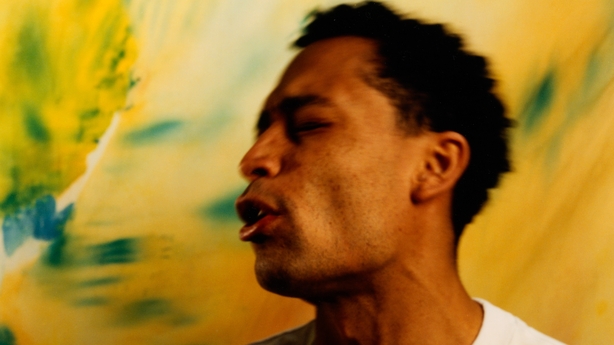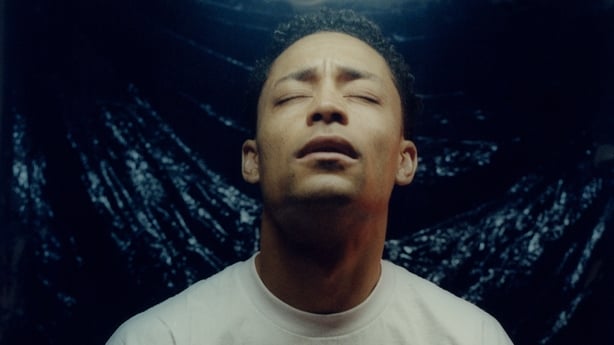]28-year-old British-Guyanese rapper Loyle Carner is a modern poetic genius, defined by the unapologetic, unashamed ownership of his multi-faceted identity. Carner’s debut 2017 album Yesterday’s Gone and subsequent 2019 album Not Waving, but Drowning set distinctive autobiographical precedents for his third masterpiece, Hugo, released in October.
Hugo epitomises Carner’s introspective trademark, chronologically laying bare his most inner demons, spanning from contention to resolve over layers of infectious syncopated beats, jazz-infused piano motifs and beautifully layered vocals. The listener experiences the resentment engendered by Loyle’s estranged relationship with his father, eventually witnessing the reconciliation and forgiveness of this fractured history. One is privy to Loyle’s fluctuating sense of selfhood synonymous with the mixed-race identity, the weight of his new found fatherhood and the internal complexities of his ADHD.
This is the story of Hugo. This is Loyle Carner - in conversation with yours truly.
I heard that Dublin is your favourite place to perform! (I say, beaming with a nauseatingly patriotic, slightly egotistical sense of pride for our beloved capital). Why is that?
"I’ve got an affinity with the people. I guess not as many people head out to Dublin to play shows like they do in London so I guess the crowd is a bit more appreciative of the people who come. There are less inhibitions. People want to have fun and make noise. I’ve always felt there is a lot of energy in the crowd – a give and take. A mutual respect. I just love it there."

Georgetown (the capital city of Loyle’s paternal homeland of Guyana) begins with the recital of the poem ‘Half-Caste’ by the legendary Guyanian poet John Agard.
Explain yuself
Wha yu mean
When yu say half-caste?
Yu mean tchaikovsky
Sit down at dah piano
An mix a black key
Wid a white keyIs a half-caste symphony?
Loyle Carner - Georgetown ft. John Agard (Prod. Madlib)
The racial slur ‘half-caste’ implies human incompleteness, deficiency or half-ness. It reinforces the notion that person of mixed race exists on the periphery of two absolutes – an individual void of whole belonging. Too black to be white and, too white to be black. An identity constantly in a state of conflict and rejection - as Loyle articulates on the track;
"I told the Black man he didn’t understand, I reached the white man he wouldn’t take my hand".
The John Agard poem resonated with me deeply. I had never heard it before - and when I did, I thought "Oh my god, this is my life... this is me".
"Wow. It meant exactly the same to me. And that’s why I put it on the album. You never really see people who are mixed race in older generations reflecting their lived experience that we share now. It just makes you feel like you belong. When I heard it, I thought "Wow, okay. What I’m going through is a real thing – like I have a real story."
There isn't an open conversation about what it’s like to be mixed race. Nobody talks about it.
Was it a conscious thing for you to start a conversation that isn’t there?
"Yeah. I think I just wasn’t seeing it in art and culture – particularly in popular culture. I have a son now, and when he grows up, I want there to be a space where he can feel seen, reflected and understood. I was kind of thinking, "What did I wish I had when I was sixteen. A lot of people ask, "Do you feel pressure to talk about this stuff" - but I don’t. I kind of feel like now, the pressure is off. It’s like I’m in a safe place for the first time. I’ve found this new bravery where I’m like 'I need to talk about this'. If people are upset then that’s fine – it's the truth. Nothing I say is a lie or a fabrication – its genuine and it means something to me."
How can you hate the roots and not hate the tree/
So how can I hate my father, without hating me.
Similarly, in Blood On My Nikes Carner inserts the remarkable 2018 House of Commons speech of then 18-year-old Camden Youth MP Athian Akec, who fiercely condemns the U.K. government’s approach to the knife crime epidemic.
How much does literature influence your musical output?
"Massively. The older I’ve gotten the more I’ve been able to make sense of how I see all these things. Malcom X to me is much of a poet as John Agard, and John Agard is as much of a political speaker as Malcom X. They are all words used for the same reason. To rally and uplift and inspire and educate. I’ve always found it frustrating with rap music that it gets pigeonholed into this thing that "It’s not that hard to do", "It’s not really literature". I guess I try and see myself as a bit of a trojan horse - to get my foot in the door and allow these people to speak so that the people who listen to my music finally get to hear some truth from people that they would never listen to otherwise."
Hugo chronologically documents Loyle’s experience as repairs his relationship with his father, prompted by the birth of his first child. As the album was conceived, the rapper and his dad travelled to Guyana – a first time for them both.

(Pic: Sirus Gahan)
How did the cultural reconnection with your Black heritage, and personal reconnection with your father impact the album?
"Deeply. I was in a place that I felt some peace. There is no tourism in Guyana really. It’s very untouched. Everything is pretty honest and a true reflection of the country, and my dad didn’t know anything about it. I always wanted my dad to teach me about my culture. So, when I went out there, I was waiting for him to be like "These are all the things you don’t understand", but instead it was actually me teaching him about our culture. It was a crazy full circle moment to educate my father on something that I always wanted him to educate me on. It was also really nice to also be reminded that I am British. There were parts where I stood out there. That thing of, "Oh, I do belong in Britain as well – there are norms and values that aren't the same out here, and I don’t want to lose them." So, from both sides I felt a kind of justification of my identity."
I hear my own story in 'Hugo'. I hear as I hear who and what I am.
Loyle Carner, in his own words.
What was the most cathartic song to make on the album? Which track affected you the most?
"I think the first and the last song, Hate and HGU. Those are the polar opposites of where my brain was at in the process. The album rides in chronological order. The first song is very angry because that is where I was – disenfranchised, not sure if I would release music, not sure if I wanted to reconnect with my father. And then the last one is about forgiving him. Both these songs were so heavy to make – to get it out of me. They were overwhelming."
We need your consent to load this Spotify contentWe use Spotify to manage extra content that can set cookies on your device and collect data about your activity. Please review their details and accept them to load the content.Manage Preferences






